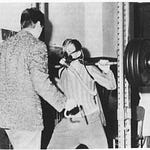In September of 2023, actor Kevin Sorbo, famous for his starring role in the 1990s television show “Hercules,” wrote an article for Fox News titled, “Let’s make Hollywood manly again.”
In his article, Sorbo argued that modern Hollywood poorly portrays men and masculinity and thus does not give boys positive role models to look up to.
In addition to critiquing Hollywood for frequently portraying fathers as “bumbling, useless idiots,” who do not contribute to their families or communities in positive ways, and who are “the butt of every woke Hollywood jab,” Sorbo also criticized Hollywood for exposing audiences to a continuous stream of bold and confident women who “upstage passive men who recede quietly into the background.”
I welcomed Sorbo’s article. Like many other movie watchers, I have grown tired of Hollywood’s trends over the past 5 to 10 years. Such trends include the push for diversity, equity, and inclusion (DEI) in casts and crews, the forced Woke messaging, the glorification of nihilism, the moral ambiguity in story lines, and the seemingly endless numbers of remakes of movies whose original versions were perfectly fine.
Thus, I commend Kevin Sorbo for his article. It was a timely, thoughtful, and largely accurate critique of one of society’s most influential institutions.
Nevertheless, I disagree with part of Sorbo’s position. In two sentences, Sorbo included the concept “sacrifice” as part of his definition of masculinity. Thus, Sorbo believes that Hollywood needs to show more male sacrifice.
“America today needs warriors; protectors; responsible and committed fathers…We need men who will raise their kids, defend their homes, provide for their families, and serve self-sacrificially…”
Then, Sorbo concluded his article by stating the following:
“It’s time for the world’s entertainment capital to reintroduce good men: men who love their wives and children, protect them, fight for what’s right, and speak up for the powerless. Men who, above all, have overcome their own selfish desires and are free to put others first. After all, that’s the most masculine thing any man can do.”
My purpose here is to highlight why Sorbo’s definition of masculinity based on the concept of “sacrifice” is flawed.
Sorbo suggested that sacrifice and the ridding one’s selfish desires is peak masculinity. Sorbo implied that raising one’s kids, defending one’s home, and providing for one’s family are sacrifices. But why view fatherhood and masculinity in this way? Why frame these responsibilities and commitments as “sacrifices”? Does a man not receive any personal boost to his ego or self-esteem when he completes these acts successfully?
To “sacrifice” something, according to novelist-philosopher Ayn Rand, means “the surrender of that which you value in favor of that which you don't” or “the surrender of a greater value for the sake of a lesser one or of a nonvalue.”
Thus, Sorbo’s view – that “sacrifice” is fundamental to masculinity and that selfishness is counter to masculinity – is problematic. It teaches boys and men not to value their own needs – i.e., themselves. It tells them that their lives hold no intrinsic worth, and that their value is predicated on serving the needs and desires of others. The male sex is mere cannon fodder.
The alternative to Sorbo’s framing of masculinity through the collectivist framework and the ethics of altruism is to frame it through the ethics of rational selfishness, which simply means to pursue one’s values in accordance with one’s long-term interests.
Unfortunately, through much of history, the word “selfishness” has been battered and mischaracterized by writers, including Sorbo, who conflate the concept with disregard of others or narcissism, which is a sort of pathological version of selfishness.
Ayn Rand explained this problematic framing of selfishness in her book, “The Virtue of Selfishness”:
“The meaning ascribed in popular usage to the word "selfishness" is not merely wrong: it represents a devastating intellectual "package-deal," which is responsible, more than any other single factor, for the arrested moral development of mankind.
In popular usage, the word "selfishness" is a synonym of evil; the image it conjures is of a murderous brute who tramples over piles of corpses to achieve his own ends, who cares for no living being and pursues nothing but the gratification of the mindless whims of any immediate moment.
Yet the exact meaning and dictionary definition of the word "selfishness" is: concern with one's own interests.
This concept does not include a moral evaluation; it does not tell us whether concern with one's own interests is good or evil; nor does it tell us what constitutes man's actual interests. It is the task of ethics to answer such questions.”
Thus, acting selfishly simply means pursing one’s own rational values. These values can certainly include loving one’s family, as Rand also explained:
“Concern for the welfare of those one loves is a rational part of one's selfish interests. If a man who is passionately in love with his wife spends a fortune to cure her of a dangerous illness, it would be absurd to claim that he does it as a "sacrifice" for her sake, not his own, and that it makes no difference to him, personally and selfishly, whether she lives or dies. Any action that a man undertakes for the benefit of those he loves is not a sacrifice.”
In other words, Sorbo was incorrect to add “sacrifice” to his definition of masculinity, because all the other features of masculinity that he described generally constitute a man acting in his own selfish interest. For example, part of becoming a warrior and protector involves continually training one’s body and mind to take on life’s challenges. Such training is a selfish act because it aids in one’s own survival. Also, raising one’s kids is not a sacrifice if a father feels joy watching his sons or daughters develop into good citizens and pursue and achieve their own selfish values.
Sorbo seems to have in mind the sort of man who consumes copious amounts of drugs or alcohol to feel momentary pleasure. Yet, such men are not selfish. They are not acting in their own rational, long-term interests. Truly selfish men value their lives too much to damage their health in such ways. In fact, part of what drives some men to participates in these problematic behaviors and short-term “solutions” to their problems is their own lack of self-esteem and self-worth.
To understand that selfishness does not conflict with the healthy manifestation of masculinity, Sorbo might consider watching the movie Taken, starring Liam Neeson.
In Taken, Neeson plays Bryan Mills – a former Green Beret and retired agent of the CIA. Mills is divorced from his wife, and he is trying to work on his relationship with his only child, Kim, who is 17 years old. Kim decides that she wants to visit Paris with one of her girlfriends. Mills, based on his years of knowledge and experience working in the military and CIA, expresses concerns about Kim going to Paris without supervision. Reluctantly, and after being pressured by both Kim and his ex-wife, Bryan agrees to let Kim travel overseas.
Interestingly, this part of the movie depicts a father’s love through his protectiveness. However, this protectiveness was ridiculed by both the ex-wife and the daughter, and both characters suffered as a result of not listening to dad, because on the day that Kim and her friend arrive in Paris, they are kidnapped and sold into an Albanian sex trafficking ring. Upon learning of this devasting news, Bryan flies to Paris to search for his daughter, her friend, and the thugs who kidnapped them.
During the search, Bryan risks his life many times, and Bryan took these risks because of his profound and selfish love of his daughter. Bryan knew that his life would be happy and more fulfilled if Kim were part of it. Thus, Saving Kim’s life was not only in Kim’s best interest, it was in Bryan’s best interest, too.
Per romantic art, Bryan overcame many physical and mental challenges in warding off evil to save Kim. In doing so, Bryan reaffirmed his distinct role as Kim’s father, and we are led to believe that seeing her grow and flourish will bring Bryan many years of joy. As Ayn Rand said, “[c]oncern for the welfare of those one loves is a rational part of one's selfish interests.”
To conclude, Kevin Sorbo deserves credit for writing an article that argues for the healthy and entertaining portrayal of men and masculinity. His concern that contemporary movies lack in positive role models for boys is correct, and if Hollywood adopted even a morsel of Sorbo’s suggested characterizations of men in films, we all would have more engaging and emotional-moving movies to watch.
Nevertheless, Sorbo’s view that “sacrifice” is fundamental to masculinity is problematic. Perhaps this is a problem of semantics. Perhaps Sorbo agrees that boys should be taught to value their own lives and pursue their own values and interests. Perhaps Sorbo simply misused the term “sacrifice.” Either way, semantics are important, and Sorbo’s sloppy use of this language illustrates the ongoing confusion about “selfishness” and “sacrifice” that Ayn Rand highlighted decades ago.
One reason why misuse of the term “sacrifice” is concerning is because it leads to the mislabelling of rationally selfish acts as sacrificial ones. The danger then is concept creep or concept realignment, wherein actual sacrifices – things that are detrimental to a man’s wellbeing – become justified, because they have been conceptually lumped together with things that are in a man’s best interest. In such cases, the concept “sacrifice” is given underserved credit, as it was in Sorbo’s article. Moreover, framing a man’s role in a relationship as a continuous stream of “sacrifice” probably does not sit well with many men when labelled as such, and use of this nomenclature coupled with the expectation of actual male sacrifice may in fact, underlie some of today’s relational and familial discord, with mom, the kids, and even dad not understanding what dad brings to the family qua his selfish masculine acts.
The purpose of art ought to be to show audiences how man ought to be or could be. It ought to give people something to look up to or strive for. It should show man at his best; at his greatest potential. It should show characters pursuing their goals, making tough decisions, and overcoming challenges. It should not be centred around depravity and the worst in man, nor should it show what the world actually is (that is what documentaries are for). Instead, movies, when written in the romantic rather than naturalistic style, should be guides for living. The reintroduction of such romantic guides into Hollywood movies is key to the counterrevolution at the cinema. This counterrevolution will indeed require a Herculean effort. But the effort will be worth it, and boys deserve it. With their fathers often out of the home, movies are still one place where lonely and confused boys can escape to find the abstractions of the men that they one day want to be.
Related Content at The Nuzzo Letter
SUPPORT THE NUZZO LETTER
If you appreciated this content, please consider supporting The Nuzzo Letter with a one-time or recurring donation. Your support is greatly appreciated. It helps me to continue to work on independent research projects and fight for my evidence-based discourse. To donate, click the DonorBox logo. In two simple steps, you can donate using ApplePay, PayPal, or another service. Thank you.


















Share this post